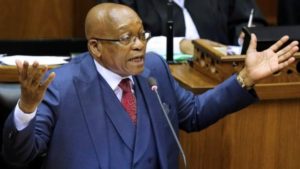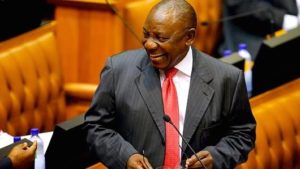The ruling African National Congress (ANC) gave President Jacob Zuma an ultimatum on Monday: resign by Wednesday or be impeached on Thursday (via vote of no-confidence).
 True to form, the hopelessly beleaguered Zuma strutted and fretted his case on TV until the eleventh hour and then resigned. No doubt he’s now hoping the sinecure he negotiated will prove secure against prosecution on over 700 pending charges of corruption.
True to form, the hopelessly beleaguered Zuma strutted and fretted his case on TV until the eleventh hour and then resigned. No doubt he’s now hoping the sinecure he negotiated will prove secure against prosecution on over 700 pending charges of corruption.
Whatever the case, his antic farewell said and done, Parliament elected his deputy, Cyril Ramaphosa, the 5th president of post-apartheid South Africa yesterday.
As it happens, I have been telegraphing this day ever since South Africans elected Zuma nine years ago. I refer you to attesting commentaries like “South African President Mbeki Forced to Resign. Hail Zuma?!” September 22, 2008, “Zuma Doing to South Africa What Mugabe Did to Zimbabwe,” December 12, 2015, and “Wither South Africa,” April 10, 2017.
Therefore, I’m not surprised that South Africa ousted Zuma this week much as Zimbabwe ousted Mugabe three months ago. And, with all due respect to viral memes, the metaphor is not South Africa kicking Zuma to the curb on Valentine’s Day. It is South Africa finally holding him to account for raping it the way he allegedly raped countless South African women, leaving the country as ravaged and depressed as he invariably left them.
Granted, there’s a silver lining in South Africans not waiting 37 years to rid themselves of his corrupt and corrosive leadership. This means that the mess Zuma left Ramaphosa pales in comparison to that which Mugabe left his successor.
 Nonetheless, it beggars belief to think that Ramaphosa will do much to clean it up. After all, he’s the poster boy for the corruption and cronyism that enabled political elites to benefit most from the country’s black-empowerment and affirmative-action policies. Policies intended, but which have failed, to lift over half of South Africa’s 56 million people out of poverty.
Nonetheless, it beggars belief to think that Ramaphosa will do much to clean it up. After all, he’s the poster boy for the corruption and cronyism that enabled political elites to benefit most from the country’s black-empowerment and affirmative-action policies. Policies intended, but which have failed, to lift over half of South Africa’s 56 million people out of poverty.
Not to mention that he is more captive to the state-capture scandals that defined Zuma’s presidency than Zuma himself.
State capture is more systematic than plain vanilla (banknote-stuffed envelope) corruption, which seeks to exploit existing opportunities. State capture goes one better by changing personnel, regulations and laws to work in one’s favour.
(Financial Times, October 17, 2017)
Only this explains Forbes ranking him among the richest South Africans with a net worth of $450 million. Even accounting for his unbridled greed and ambition, this has to be more wealth than Ramaphosa ever imagined amassing.
Nelson Mandela, the father of black South Africa, reportedly tapped Ramaphosa 20 years ago as his preferred successor. Therefore, South Africans can be forgiven for hoping that he is now free to fully (re)commit himself to the poverty alleviation and sustainability programs that inspired Mandela to do so.
Incidentally, Mandela and Lee Kuan Yew, the father of modern Singapore, enjoyed a mutual admiration society. I suspect this was based on Mandela’s interest in modeling South Africa’s development on Singapore’s and Lee’s interest in basking in the reflected glow of Mandela’s moral authority and statesmanship. Lee fully basked; alas, South Africa never fully modeled.
 In any event, the best thing South Africans can do at this point is to vote for Mmusi Maimane and his Democratic Alliance (DA) in next year’s general elections. Because he personifies the leadership and the DA champions the values Mandela saw in Ramaphosa and the ANC, respectively.
In any event, the best thing South Africans can do at this point is to vote for Mmusi Maimane and his Democratic Alliance (DA) in next year’s general elections. Because he personifies the leadership and the DA champions the values Mandela saw in Ramaphosa and the ANC, respectively.
In fact, ANC leaders have so betrayed their party’s founding values that it will take a generation or two for new leaders to rediscover them. And you don’t have to take my word; ANC stalwarts like Nobel Laureates Nadine Gordimer and Desmond Tutu have bemoaned this fact.
I duly commented on their disaffection and disillusionment in commentaries like “South Africa Betraying Its Values,” May 13, 2011, “Massacre at South Africa’s Lonmin Marikana Mine,” April 17, 2012, “Chief Prosecutor Condemns SA President Zuma and His Ruling ANC,” October 21, 2013, and “South Africa Joins Ranks of Countries Selling Its Sovereignty to China,” October 3, 2014.
But nothing damns the ANC quite like this from the universally acclaimed French economist Thomas Piketty – as quoted in the October 6, 2015, edition of The Guardian:
We are 25 years after the fall of apartheid … [but] inequality is not only still very high in South Africa, but has been rising and in some ways income inequality is even higher today than 20 years ago.
Amandla! … Ngawethu!
Related commentaries:
Mbeki resign…
Zuma doing to SA…
Wither SA…
Zimbabwe outs Mugabe…
SA betraying values…
Massacre at Lonmin…
Chief prosecutor…
SA selling sovereignty…